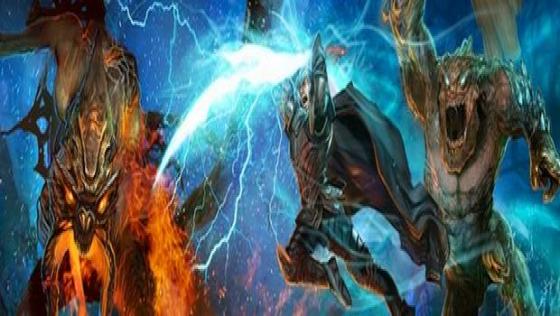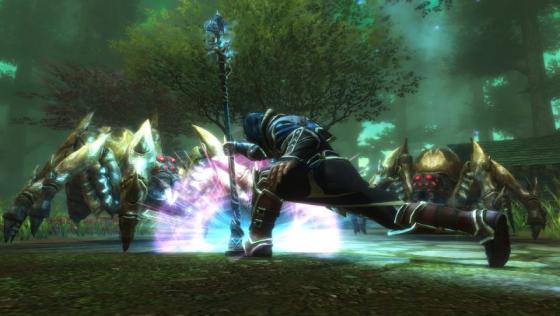
TheSixthAxis
 24th February 2012
24th February 2012
Author: Jim Hargreaves
Publisher: Electronic Arts
Machine: PlayStation 3 (US Version)
Kingdoms of Amalur: Reckoning (PS3, Xbox 360)
Ever since its announcement there has been a capacious amount of buzz surrounding Kingdoms of Amalur: Reckoning, and not just because 38 Studios founder, Curt Schilling, happens to be a retired baseball hero. Having acquired Big Huge Games (Rise of Nations) and employing the talents of best-selling novelist R.A Salvatore and artist Todd McFarlane, Reckoning isn't carrying just one high profile on its shoulders either.
As if expectations for the new IP weren't demanding enough, there is already talk of a possible sequel, 38 Studios is currently working on an MMO set in the Amalur universe too. There's plenty riding on the success of this soon-to-be fantasy franchise, but has the first instalment gotten off on the right foot?
The premise on which Amalur's lore is based on is an intriguing one to say the least. In Salvatore's fantasy universe there is a divide between the imperishable Fae and the mortal races, commonly referred to as "Children of Dust." Despite this animosity the two have co-existed for centuries, their lives dictated by Fate - a metaphorical spectre that shapes their destinies and cannot be undone.
Where mortals may die, the Fae live out their prescribed existence before being returned to "the Great Circle" only to return with a change of the seasons. Amalur's problems begin with the rise of Gadflow, the game's lead antagonist who seizes the throne of the Winter Court by deception. With his new found power he seeks to eradicate the mortal races.Elsewhere in the kingdoms you, the player, awake to find yourself bathing in a pit of rotting flesh. Struggling your way free and exploring your surrounding you discover that the Gnomes have been working to create their own process of revivification, the Well of Souls, and you just happen to be their first success.
With Gadflow's "Tuatha" army rising in the East, you set out on a quest to protect the Childern of Dust from their would-be destructor, also looking to explore the circumstances of your death.
The opening chapter of Reckoning will have you hooked, wanting to pursue the end goal as you would in most story-driven games. However, about an hour into the experience, the stabilisers are torn from beneath you, tossing you in a beguiling, seemingly endless open world.Amalur's map is broken into five regions, each one with a smattering of camps, settlements, and fortresses punctuated with the occasional village or city hub; each hot spot (and the roads between) is literally swarming with optional side-quests. If you're a seasoned MMO veteran it probably won't phase you, though no doubt most players will snap up every assignment within reach. So deep and varied are these side-quests that I somehow managed to wander from the main quest-line, returning five hours later, realising that I had lost the narrative thread entirely.
You see, although Reckoning may weave a fine, complex tapestry of background lore, it's inexcusable threadbare in the most important areas. Aside from drunken Fateweaver, Agarth, and your mysterious, scantily clad acquaintance, Alyn Shir, there are no other worthwhile or immersing characters; a shock really as Amalur is teeming with hundreds of NPCs. You could say that Reckoning suffers from Homefront-syndrome; the build-up and premise are superb, but the game itself portrays a simple A to B adventure.
It's a textbook MMO structure, as characterised by the bland exchanges of dialogue that regurgitate names of concepts, events and characters you likely won't know or care about. Ironically enough BioWare, the contemporary masters of RPG characterization, have recently found success in binding the MMO genre to a persistent narrative core in The Old Republic, something 38 Studios have failed at despite the action RPG genre be more maluable.That's not to say that Reckoning's lore can't be enjoyed, it's just presented in a way that lacks cinematic drive and offers little to the overall experience. The complaints may seem dragged out, and to some extent, a tad bit unfair on a new IP, but considering that 38 Studios is pinning all of its hopes on this rich fantasy universe to uphold a chain of possible sequels, it has to be addressed.
As far as gameplay goes, Reckoning puts the action in action-RPG, combining the expansive open world of an MMO with hack and slash gameplay akin to God of War. The four playable races may not offer any dramatic differences between them, but the class you select will ultimately dictate your play-style and the way you approach battles.
As you progress through levels one to forty, three ability points will be awarded for each time you rank up. These can then be assigned to one of three trees: Might, Finesse, and Sorcery, which essentially amount to warrior, rogue, and mage. Each tree has 22 abilities on offer, some active and others passive, gradually becoming stronger as you invest more points. It's a simple system that's easy to get to grips with, allowing players to mix and match between the three trees. Ability points can also be undone and reassigned through Fateweavers, acting as a re-spec vendor.Each of the game's weapon types have similar move sets, though attributes such as speed and strength will favour some play-styles over others. For instance, rogue-builds won't have much use for longswords of hammers; their typically low armour protection suits the use of stealth and ranged attacks, though as mentioned before there is the room to be creative; Reckoning allowing for a number of hybrid class combinations.
Two weapons can be equipped at any time, one primary, one secondary, each assigned to one of the two available face buttons. It sounds fairly bare-boned, and it can be at times, but the dual-weapon system leaves room for players to instantly switch stances and turn the table on their opponents. A little more depth is then added by the inclusion of four interchangeable combat abilities. The combat may not reach the heights of other well-established action adventure titles, but considering that Reckoning is also packing over 50 hours of content, it has been well realised. Another leaf taken from the ageing tome of MMO conventions is crafting. Scattered throughout Amalur are reagents, crystal shards and equipment which can be harvested from regular nodes, stripped from fallen enemies or plundered from treasure chests. Components can then be manually combined at work stations to produce potions, gems, and armour; the more points you assign to a skill, the better the end result.
Crafting never intrudes on the overall experience but for those looking to max out their hero, it's near essential with many of the best weapons being player-made creations. It isn't all artisan work however, skills such as detect hidden, dispel, stealth and lock-picking are all adopted when scouring the plains and caves of Reckoning.Kingdoms of Amalur is far from ground-breaking when it comes to visual performance, matching up nicely with games such as Dragon Age 2. What it lacks in raw game engine power is counterbalanced with its unique art direction however, Amalur straddling the line between Azerothian and fairytale, with evident Celtic influences.
Both the five regions and the creatures which inhabit them demonstrate a fair degree of variety, and although the six main races are essentially re-hashes of the same humanoid archetype, enemies such as the Boggarts, Jottun, and Bolgan inject some unique elements and colour into Reckoning's bestiary, enhanced by the game's rich, vibrant colour palette.
Good Points
- Well above 40 hours of content.
- Character progression is non-intrusive.
- Variety of skills to upgrade.
- Successful binding of hack n' slash, action RPG, and MMO genres.
- Crafting is actually useful, adding depth to the already thorough loot system.
- The foundational lore propping the game up is intriguing to say the least.
Bad Points
- Simple A to B plot made worse by one-dimensional, ultimately forgettable characters.
- Borrows from the MMO genre a little too much.
- Combat could still use a bit of work.
Verdict
38 Studios has made a triumphant debut with Reckoning, but there is a long way to go before the Amalur IP reaches its full potential. The combination of an MMO open-world structure with hack n' slash combat mechanics works well if a little patchy in places; weapons are in dire need of more combos, and the block/dodge system also lacks the finesse of its contemporaries.
These are issues that can easily be ironed out however, though the same can't be said about the game's underpinning lore. Sporadic in pace and quality of content, this is the area in which Reckoning borrows too heavily from its MMO ancestry and it really doesn't pay off.
Other PlayStation 3 Game Reviews By Jim Hargreaves
-
Champion Jockey: G1 Jockey & Gallop Racer

-
Warriors: Legends Of Troy

-
Uncharted 3: Drake's Deception - Drake's Deception Map Pack

-
Captain America: Super Soldier

-
Awesomenauts

-
Dragon's Crown

-
The House Of The Dead: Overkill (Extended Cut)

-
LEGO Batman 2: DC Super Heroes

-
Sniper: Ghost Warrior

-
Sniper Elite V2

Scores
PlayStation 3 Version| Overall | 70% |





